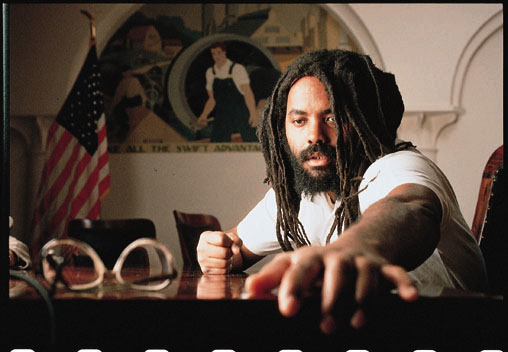
I lived in Philadelphia for 5 years.
Granted, I will never claim the city as my own (especially because I rep my set hard --- JERSEY CITY!) but living there has forced me to become an open Mumia supporter. Therefore, when I found this article in my google reader, I couldn't help but make faces. While it is admittedly biased, and a fresh write after the one-sit read of Maureen Faulkner's book, Levitt overlooks the hostile racial context that exists between the targeted black community of Philadelphia in the 1980s and the city administration/police. Levitt and many of the responses in the comments below, albeit some admittedly ignorant to the details of the case, have no understanding of the hostile climate and racial polarity existing from Southwest Philly to Fishtown. Those dichotomies are alive, well, and perpetuated. An entire city block, where a political group who supported Philly's black community was BOMBED by the Philadelphia police. If you'd like to learn more, the MOVE bombing under Mayor Rizzo was a key event which heightened tensions and galvanized efforts in the black community against excused police brutality and racial profiling.
Anyway, let's get back to that Levitt article. An excerpt from Maureen Faulkner's book:
As I pumped gas, a young man, a white kid who looked college age, pulled up behind me. He was wearing a T-shirt that read “Free Mumia Abu-Jamal,” and it immediately caught my eye.
I walked up and asked him where he got the T-shirt. He said he was a student at U.C.L.A. and they had recently held a rally for Abu-Jamal. I asked him if he knew anything about the case in which Abu-Jamal was involved.
He said, “Well, I know that this guy was a Black Panther who was railroaded. Someone else shot a police officer and he was framed for it.” I cringed when he went on with the usual recitation of misinformation being spun by the Abu-Jamal defenders: a peaceful black activist, a social dissident, hostile white police force, F.B.I. surveillance, conned eyewitness accounts, phony ballistics, etc.
I heard him out and offered to provide him with the actual facts of the case. He politely declined my offer. Before I left, I suggested that when he wore a political statement on his chest he would be well served if he knew his facts, because you never know when you might run into the widow of the officer. I left him in stunned silence.
I guess what bothers me most is the passive-aggressive jab with which Mrs. Faulkner ends her encounter with the Mumia-supporter. Her actions are reflective of a weird power dynamic that can't be equated to one taking a principled stance --- which is what fuels any kind of self-protest or show of resistance. Her response relies mostly on evoking pathos, and sure she is a mourning spouse, so hey. Why not? But my bottom line: I would not tote this action as a +1 on the tally if I were in her shoes.
To say that Mumia has no right to contest his innocence is a gross misunderstanding our entitlements as Americans protected under the Bill of Rights. To say that it is wrong for him to have supporters is infantile. To say that we cannot reconcile the upset of not having been granted what we feel entitled, well, now that would be more accurate. Being a citizen of this country means more than getting our way, and turning emotions into commodity. Loss is real, to put a price on that would be proof that our nation has failed us.
It is awful that Daniel Faulkner is dead. It is awful that Mumia has been imprisoned for 30 years. It is awful that the families of these men have been silenced and slung through the mud, prolonging their mourning. While some may argue, "Well, at least Mumia is alive!" I can only ask what is life to a man whose innocence is doubted, where the privilege to live teeters on the hungry public's subjectivisms? The public's sway merely fuels hate and furthers the racial divide in Philadelphia. (ie: Geno's Steaks in Philly proudly carries a "Murdered by Mumia" sticker in the front window. Therefore, some people opt not to patron their establishment.) Let's save the "order in English" sticker for another day, ok?
Let me be clear, I am not questioning fault. We can argue who is innocent and who is guilty until the sun comes up over Santa Monica Boulevard. I am questioning process, ideas of accountability, and the current biases found and applied within existing legislation. In light of the recent verdict of the Sean Bell case, where all the charges placed on police in Bell's murder case were dropped, can we make connections in the obvious push that the judicial system finds safety in placing the onus on black men, when pitted against white cops? I wonder what Maureen Faulkner thinks about that case? Faulkner died in Philly/1981, and Sean Bell died in NYC/2006, can we rightfully challenge what seems to be a systematic targeting on a national level? Mind you, these are only the reported cases that see the light of mainstream day. Because there is no accountability to Americans, those in mourning are left to become more enraged, and find victories in the simple act of evoking pathos from a college student with a t-shirt on.
These crumbs are the privileges to which we are all entitled in our country.
Today, I will wear black to show my solidarity with those in the streets for Sean Bell, and all victims of police brutality. You should, too.



Hi, I enjoyed your thoughtful essay. Below here is my video from the April 19 demo, featuring a bunch of racist skinheads saying "Fry Mumia and his Supporters," which I thought you might enjoy, given your commentary on the racial politics.
ReplyDeletehttp://www.youtube.com/watch?v=5DsNJalDIuc